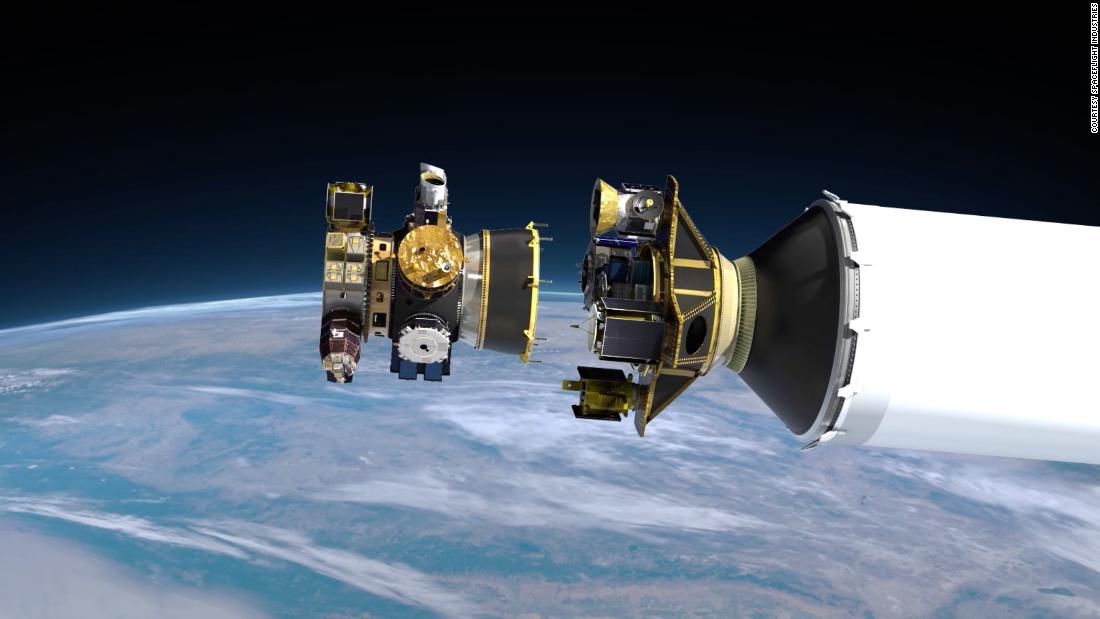
Elon Musk's company launched a rocket from Vandenberg Air Force Base in California on Monday after a series of delays triggered by bad weather and last-minute inspections for the rocket. It marked one of the largest satellite ride-sharing missions ever launched and the most crowded single mission in US history, according to Spaceflight, SpaceX's customer for the launch.
The mission illustrated the growing demand to launch small satellites, modern devices that some companies hope will empower an array of new businesses — from internet service to supply chain monitoring.
For SpaceX, Monday's mission, called SSO-A, marked its 19th launch of 2018, surpassing its previous annual record of 18 launches last year.
It was also the first time Musk's company attempted to fly one of its rocket boosters for a third time. The booster, covered in black soot from its two prior flights, landed again on a remote controlled platform in the Pacific Ocean after launch, queuing up the rocket to fly for a fourth time.
SpaceX's goal is to drastically reduce the cost of a launch by reusing the hardware, a feat its competitors long thought was impossible or uneconomical.
The latest version of SpaceX's Falcon 9 rocket, called Block 5, is designed to fly as many as 100 times before retirement, and up to 10 times without significant refurbishment between flights.
The first-stage booster used for the SSO-A mission flew twice in the past six months — first on May 11 for the Bangabandhu mission and again August 7 for Merah Putih.
SpaceX also tried again Monday to recover the rocket's fairing, the bulging cone at the top of the rocket that shields satellites during launch. Musk has said the fairing costs about $6 million.
The company has tried on several occasions to guide the fairing, using parachutes, to a soft landing into a giant net hoisted up by a crew boat called Mr. Steven. But it has yet to hit the mark.
Musk said in a tweet Monday that the fairing halves "missed the net, but touched down softly in the water."
Experts have told CNN Business that salt water can damage electronics and components inside the fairing, likely making the part unusable if it hits the ocean. But Musk said SpaceX will attempt to refurbish the nose cone.
"Plan is to dry them out & launch again," he said. "Nothing wrong with a little swim."
Satellite ride sharing
SpaceX's customer for the SSO-A mission, Spaceflight, aims to be a sort of Uber service for space. The company has for years worked as a liaison between small satellite companies and launch providers, looking to put small payloads onto rockets with extra room on board.
"We started off just selling the excess capacity on whatever launches were out there," Spaceflight president Curt Blake told CNN Business in a recent interview. "Then, we said, 'Wow demand is so big, we should just buy a whole rocket ourselves.' That's how this mission came to be."
SSO-A was the first mission Spaceflight has filled a rocket entirely with its small satellite customers. They came from 34 companies and organizations across 17 countries.
They included Australia-based Fleet Space Technologies, which aims to connect remote devices to the internet via satellite. Two companies — US-based Capella Space Corporation and Finland's ICEYE — seek to use advanced radars to track airplanes or ships, even in cloudy weather. A group of middle school students from Florida sent an experimental astrobiology satellite. And an art project, funded by the Los Angeles County Museum of Art, that pays homage to the first African American astronaut, Robert Henry Lawrence Jr., also took flight.
Deploying all 64 satellites safely is tricky business. The devices, which span a variety of shapes and sizes, rode to space affixed to sides of a large structure, called a payload stack, that was shielded by the Falcon 9's fairing during launch. Once in orbit, the fairing fell away, and the satellites popped off from the payload stack in a carefully orchestrated sequence.
About half an hour after launch, SpaceX confirmed that four satellites were deployed from the payload stack. Spaceflight is expected to share updates about the remaining payloads.
Crowded ridesharing missions like this one have been executed before. India's space agency last year shattered a world record by launching 104 small satellites with a single rocket. Another mission from Russia in 2014 deployed 37 satellites.
Smallsats and space debris
There is a massive backlog of small satellites waiting to get to orbit. And companies including SpaceX and OneWeb are racing to send constellations of thousands of high-speed internet satellites into low-Earth orbit.
While hitching a ride with larger payloads is considered the cheapest option for getting to space, many nascent rocket companies are promising lightweight rockets that can be mass produced and make cheap, frequent trips to orbit.
One such company, US-based Rocket Lab, became the first to reach orbit, and has notched two missions so far. Its backlog of customers is so long that CEO Peter Beck told CNN Business the company is "not constrained by customers right now — we're only constrained by how quickly we can build rockets."
The massive influx of new satellites into low-Earth orbit poses difficult questions for the space sector, particularly when it comes to orbital debris.
The issue took center stage last month for the US Federal Communications Commission, which authorizes telecom satellites for launch. The agency is considering updating a set of 2004 rules, "seeking to keep pace with technological and market changes, and to incorporate improvements in debris mitigation practices," the FCC said.
Bagikan Berita Ini














0 Response to "SpaceX launched 64 satellites in record-breaking mission - CNN"
Post a Comment